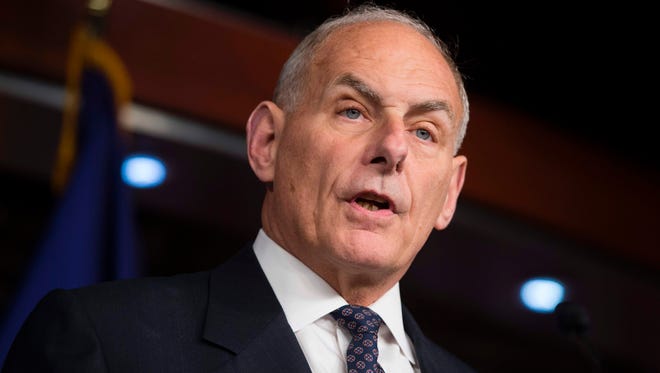In break with Trump, top intelligence and homeland security officials affirm Russia's election meddling
 Kevin Johnson
Kevin Johnson
ASPEN, Colo. – President Trump still won't say whether he believes the Russian government meddled in the presidential election. But his top intelligence and homeland security officials this week affirmed the intelligence community's unqualified assessment that it did.
CIA Director Mike Pompeo, Homeland Security Secretary John Kelly, and White House Homeland and Counterterrorism adviser Thomas Bossert all said they backed the intelligence community's conclusion that Russia carried out a campaign of cyberattacks and fake news to influence the election in favor of Trump.
"There is a pretty clear and easy answer to that and that is yes,'' Bossert said Thursday, adding that there was no reason to doubt the findings.
Pompeo went even further, saying Russia has been meddling in U.S. elections for years, not just in 2016.
"Of course,'' Pompeo said Thursday of the Russian efforts last year. "And the one before that, and the one before that. "(Russia) has no intention of backing off.''
The affirmations came during often animated discussions about the country's cyber vulnerabilities at the annual Aspen Security Forum. One day earlier, Kelly also acknowledged the intelligence community's findings that Putin orchestrated the campaign to hack Democratic political organizations and leak stolen material to websites such as WikiLeaks.
The officials' public remarks, along with previous acknowledgments by top administration officials, appeared to put even more distance between the president and his own top advisers on a critical, and still looming, national security threat.
As recently as last week, Trump continued to equivocate on whether he believes the intelligence community's assessment, even after his meetings with Russian President Vladimir Putin at the G-20 Summit in Hamburg, Germany.
"I'm not saying it wasn't Russia,'' Trump said.
"What I'm saying is that we have to protect ourselves no matter who it is. You know, China is very good at this," he continued. "I hate to say it, North Korea is very good at this. Look what they did to Sony Studios. They were the ones that did the whole deal to Sony. You know, we’re dealing with highly sophisticated people."
Trump was referring to the 2014 hack of Sony Pictures, which siphoned volumes of personal data and sensitive internal emails. The U.S. government later attributed the attack to North Korea – a conclusion Trump did not appear to dispute.
At the Hamburg meeting with Trump, Putin denied any involvement in the election, later issuing a statement that he believed Trump accepted his claim – and that reporters should ask the U.S. president for his thoughts.
Trump still has not refuted Putin's assertion. "I said, 'did you do it?' And he said no, I did not. Absolutely not," Trump told Reuters in an interview following the summit meeting. "I then asked him a second time in a totally different way. He said absolutely not."
Asked to reconcile Trump's alternative view against a such a widely-acknowledged attack, Pompeo said: "My team is fully engaged; my team understands the threat. It is not always the case that you can convince the policy maker.''
Bossert, who occupies an office just below the Oval Office, reasserted the intelligence community's claim that there was no evidence that Russia's operation tampered with actual ballots.
He also disputed suggestions that the administration was not doing enough to counter the continuing threat, indicating that an administration report on cyber deterrence was due in August aimed at upping the country's defenses.
In response to the Russia attack, the Obama administration responded by expelling 35 Russian diplomats and shuttering two Russian compounds in Maryland and New York, believed to be spy outposts for the Kremlin.
Some lawmakers and experts have called on the Trump administration to take tougher action against Russia.
Bossert suggested that U.S. could take more direct action to retaliate.
"Not one bad actor is paying for their actions,'' Bossert said.
With the 2018 elections looming, Kelly said the U.S. has been offering assistance to state election officials to bolster their defenses. At least 21 state election systems were targeted by Russia during 2016, federal authorities said.
But Kelly said local authorities continue to be wary of any federal intervention.
"We don't want you involved in our election policies,'' Kelly said, recounting a now-common refrain from state officials.
"I think they would be nuts if they don't accept help,'' the secretary said.